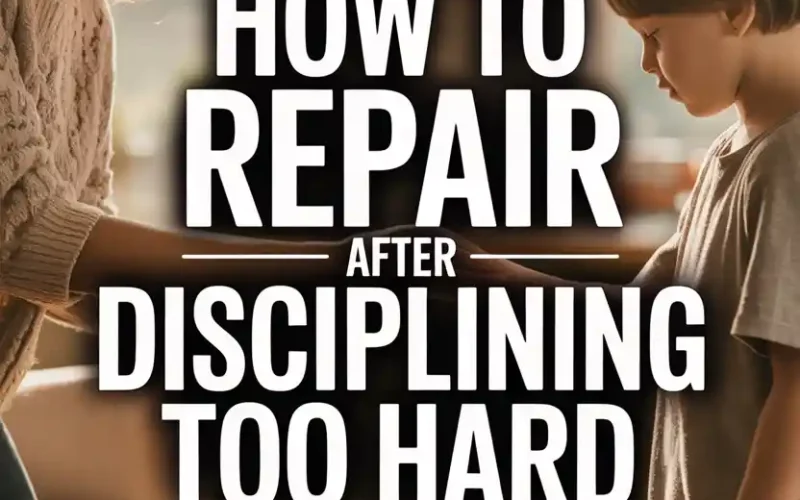Ever shut the bathroom door and whispered, “Well, that escalated quickly”?
Parenting comes with peaks that feel like gentle, sunlit hills…and the odd vertical cliff face. Sometimes, despite our best intentions, things go sideways.
Maybe your voice boomed louder than the kettle’s whistle. Maybe your child’s wide eyes haunt you long after the storm has passed. What now?
There’s good news: you can mend the bridge. Kids are surprisingly forgiving when we show up with empathy, humility, and a plan.
Here’s what helps when you’ve gone overboard and want to reconnect with your child—and your own sense of “I’ve got this.”
Catch Your Own Breath First
Picture this: your toddler’s face is streaked with tears, you’re mentally replaying your Oscar-worthy meltdown, and the guilt is creeping in like fog.
Before wading in with apologies and explanations, pause. Take three slow, deep breaths. (Yes, really. Even if your inner critic is rolling its eyes.)
Kids are emotional sponges. If you charge back in with adrenaline still pumping, they’ll feel it.
Calm your body, and your words will follow. If you need a few minutes to reset, say, “I need a moment to calm down before we talk.”
You’re not only modeling self-regulation but also giving both of you a fighting chance to communicate without fresh sparks flying.
Science backs this up. Research shows that parents who regulate their emotions in front of their kids raise humans who are better at doing the same.
Get Honest With Yourself
Before you channel your inner sage, figure out what happened.
Why did you lose your cool? Was it the shrieking that never ended, a tough day at work, or did you step on yet another piece of Lego? (Again, who even invented those things?)
A little self-reflection goes a long way.
Maybe you expected too much. Maybe you reacted to your own childhood echoes. Maybe you just need a nap. No shame—just honesty.
The more you understand your triggers, the better you’ll get at heading them off at the pass.
Also, give yourself a smidge of grace. Every parent has “those” moments.
You’re not the first, you won’t be the last, and you’re still a good parent. Really.
Offer a Genuine, Age-Appropriate Apology
Marching in with a lawyer’s apology—“Sorry you feel that way”—won’t cut it. Kids have built-in radar for fake. Reverse-engineer what you’d want to hear if the roles were flipped.
For little ones, simple is best: “I yelled. That was scary. I’m sorry.” For older kids: “I overreacted. I shouldn’t have shouted at you. I’m sorry I handled it that way.”
Add specifics: “It’s not okay to slam doors, but I want to talk with you when I’m calm.”
Saying sorry doesn’t mean your child was right to, say, draw on the cat. It means you’re owning your part.
You’re showing them adults make mistakes too—and how to make amends. Experts agree this builds trust and models accountability.
Allow Space for Their Feelings
Apologizing is only half the story. The other half? Listening.
Give your child room to share how they felt. Maybe they were scared, confused, or angry. Maybe they’re not ready to talk yet. That’s okay.
Try, “I’d like to hear how you felt. You can tell me when you’re ready.” Resist the urge to defend yourself or minimize their experience. (And, no matter how tempting, avoid, “But you made me so mad!” That’s a trap.)
Young children might express themselves through play or drawing. Older ones may need more time before they open up.
Stick around. Let them know their feelings are safe with you.
Reconnect Through Small Gestures
Words matter, but actions sew things back together.
After the tears and the talking, look for quiet ways to reconnect. Share a cuddle, read a book together, cook their favourite meal, or just sit nearby while they play.
Physical affection can say what words can’t.
Touch, laughter, or even a silly dance in the kitchen can smooth some of the rough edges. Studies suggest these moments reinforce a child’s sense of safety and belonging.
Revisit the Original Behavior—Gently
Repairing doesn’t mean brushing off what triggered the clash.
Once things are calm, circle back—gently. “I’m sorry I yelled, but we still need to talk about what happened with your sister’s paint set.” Clarity, not a guilt trip.
Talk together about what went wrong, what could be done differently next time, and give your child a chance to reflect, too. “What do you think we could try if this happens again?”
Sometimes, kids have surprisingly good ideas—when they’re not in full meltdown mode.
Check Your Expectations and Routine
If you find yourself blowing your stack more often than the kettle, it might be time for a bit of a reset.
Are your expectations realistic for your child’s age and stage? Is everyone getting enough sleep, food, downtime?
Small adjustments—earlier dinner, wind-down time before bed, five extra minutes for transitions—can work wonders.
If your family is stuck in a cycle of stress, sometimes the fix is less about discipline and more about the daily rhythm.
Parenting experts point out that prevention is always easier than repair.
Teach Repair as a Family Habit
Messing up isn’t the end of the story. It’s an opportunity.
When you apologise and make amends, you’re teaching your child the same life skill—they’ll need it for friendships, future partners, work colleagues, you name it.
Encourage your child to practice repairing with siblings or friends.
If they snap at you, let them know you appreciate it when they come back and say, “Sorry, Mum, I didn’t mean it.” Make repair normal, not something awkward or shameful.
Sharing stories (yours, theirs, or even favourite characters’) about making mistakes and fixing them can be a gentle way to keep the conversation going.
When the “Repair” Needs Support
Sometimes, the aftermath lingers. If you notice your child withdrawing, acting out more than usual, or struggling at school or nursery, it may be worth chatting with a child development professional.
Reaching out isn’t a sign of failure. It’s just another tool in your kit.
Parenting was never meant to be a solo sport, and we all need a bit of backup now and then.
Self-Compassion: Don’t Leave Yourself Behind
Here’s the bit most parents skip: forgiving yourself. Lingering guilt won’t help your child, and it certainly won’t help you.
You’re human. You’re learning. Tomorrow is another go at it.
If you find your “mistake replay” reel rolling at bedtime, try talking to yourself the way you’d talk to a friend. Remind yourself of what you’re doing well.
Maybe even jot down one thing you’re proud of today, even if it’s “kept both kids alive and only cried in the toilet once.”
The Power of Repair—For You and Your Child
Messy moments are part and parcel of raising small humans.
What matters most is not never messing up (that’s a fantasy reserved for imaginary parents with imaginary children), but how you patch things up afterwards.
Each time you repair, you’re showing your child what love looks like when things aren’t perfect.
You’re teaching resilience—for both of you. That’s a gift that lasts much longer than spotless discipline records or Instagram-perfect afternoons.
And if you ever need a reminder, there’s a whole world of parents out there, sitting on the bathroom floor, making the same promises to try again tomorrow. You’re in good company.




